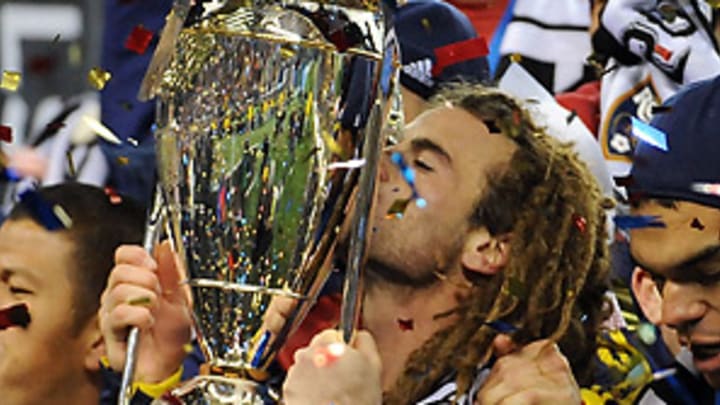America embraces Beautiful Game


SEATTLE -- On Sunday, as Qwest Field swirled with glitter and noise at the end of the MLS Cup final, I couldn't help but think of Paul Caligiuri.
Last week marked the 20th anniversary of Caligiuri's so-called "Shot Heard 'Round the World," that looping goal in Trinidad that sent the U.S. national team to the 1990 World Cup in Italy -- the Yanks' first trip to the big dance in 40 years.
It also, I would argue, catalyzed America's modern soccer movement, or whatever you want to call it. A year earlier at the 1988 Summer Olympics, former U.S. captain John Harkes recalled to me recently, the Beautiful Game was so mysterious to Americans that a reporter in Seoul asked him to explain what a goal kick is.
This wasn't simply a lack of knowledge; this was almost willful ignorance. Why should I care about the rules, even the basics? No one in America cares about this foreign game.
There was some truth to this -- if America only existed in the mainstream. There were plenty of outcasts who cared. They cared more than anything. They played in leagues and pickup games, and they followed the international game as best they could.
It wasn't easy back then. They had to wake up at the crack of dawn, lie about their age, and sneak into Irish pubs to catch the FA Cup on satellite TV. They traded grainy VHS tapes of G'olé and Tor! Total Football, paid the import price for the '86 World Cup sticker-book and stickers, stole their parents' car to go to a jam-packed soccer store like George's in Lathrup Village, Mich., to buy a pair of Copas or Patricks.
They were the ones who celebrated "The Shot" and screamed in anguish when Tab Ramos and Peter Vermes nearly scored against Italy in the World Cup the following summer. (I still clench up nervously when I think about Ramos' free kick.) They understood what it meant to go to the World Cup, especially with the biggest sporting event in the world coming to America in 1994.
"We woke up a nation of semi-soccer fans," Harkes said. "It solidified the decision to hold the '94 World Cup here. Really, the 1990 World Cup was the first platform to prove to our country that we could compete on the world stage."
Prove to our country. It's heartbreaking to think about a 22-year-old player wearing his nation's jersey, standing with his hand on his heart for the national anthem, and feeling that his own countrymen aren't behind him. But Harkes is right. For all the U.S. soccer players' attempts to compete on the world stage these past two decades, they have really been trying to compete for the hearts and minds of Americans.
Which is why I thought of Caligiuri when Real Salt Lake captain KyleBeckerman lifted the Philip F. Anschutz Trophy at the end of the MLS Cup final. Because here was the fire ignited by Cal's goal -- passionate, knowledgeable fans (and not only fans of the competing teams), international superstars, a full press box, serious analysis of the game on national TV, an all-night party in Seattle's Pioneer Square.
Beckerman, for my money, was the best player on the field on Sunday. Maybe not the most valuable in terms of earning RSL the trophy -- but over the 120 minutes, no one was more consistent or dominant in his position. The dreadlocked beast was, well, a beast.
"We played our hearts out," the skipper said. "We played our style of soccer. I think it's fun to watch. It's definitely fun to play. The star for us is the whole team. When we play well, it's because everyone is playing well."
Beckerman has to be a serious contender for the U.S. squad next summer in South Africa. Which is what this is all about in the end: competing on the world stage, as Harkes put it.
Twenty years ago, American soccer players had to "prove" themselves to their own country. After seeing Sunday's game in front of an electric crowd, we can safely say: mission accomplished. If the sold-out MLS Cup final -- and really, Seattle's embrace of the Sounders and the league all season -- proves anything, it's that Americans now believe in this game and believe that American soccer is important.
There's still a long way to go before we prove it to the rest of the world, but no one can say that Americans don't care. And no one is asking what a goal kick is anymore.
